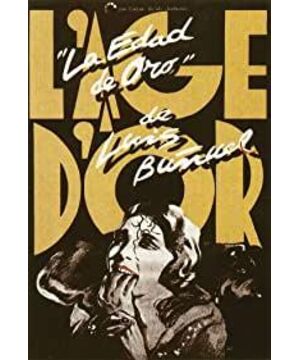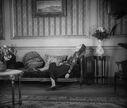The name of the film is called the golden age, which refers to the golden age of zbism, and it is also the dirtiest era. The title uses a silent documentary to show the scorpion's body structure and life habits, symbolizing the zb family, who can attack everything for zb. It also symbolizes that the male protagonist must be reported. The four bishops chanting on the cliff alluded to the origin of the jd religion. In the end, they turned into bones, indicating that the zj is dead and the true doctrine has been lost. That group of bandits, seemingly a group of gold prospectors or treasure hunters who were about to starve to death, could not leave, so they built the original city of Rome. The stone symbolizing the foundation of Rome was smeared with cement, symbolizing the official establishment of the city of Rome. In the crowd at this time, the male lead wanted to rape the female lead, but was stopped by the crowd, but the female lead seemed reluctant to leave. Later, surrealist scenes such as burning paper towels, rolling magma, and surging winds were used to express the desires of the two people. The male protagonist is a representative of the International Friendship Association, but he has a grumpy temper, and he must be reported. Therefore, he can be seen kicking puppies, stepping on bugs, beating blind people, slapping women, and scolding the Minister of the Interior for delaying him and his daughter for the deaths of a few kids. Lord affectionate. All this satirizes the so-called charitable and humane false face of the zc class. Afterwards, the camera turned to the view of the city of Rome. We can see that the collapse of houses symbolizes the collapse of the city of Rome; people are holding violins, which symbolizes the abandonment of traditional art; men learn to walk with sages on top of stones, ironically that modern people only inherit the form of the saint but not the spirit. The advertisements on the streets allude to the zbism consumer culture. The advertisements are filled with women's body parts, and they are completely consuming women's bodies and people's desires. At the same time, it also shows the longing of the male lead and the female lead. Then the camera came to the Marquis' ball. The carriage represents the working wc class, but everyone turns a blind eye to them, which shows that in the upper class, everyone does not take the wc class in their eyes, and automatically ignores their actions. The Marquis was talking to someone, and the flies on his face represented his dirty thoughts. The kitchen caught fire, the maid was burned to death, and everyone continued the dance. The child was killed for being naughty. Everyone went to watch the excitement when they heard the gunshots, but no one cared about his life or death. It satirizes the insensitivity of the zc class, no matter whether other people live or die, just be a boring spectator. The male lead arrives with the same dress as the female lead, which symbolizes the desire for the female lead and the desire to make affection with the female lead. When the male lead hit the old woman, the old woman's husband did not dare to fight back, which satirized the hypocrisy of upper-class etiquette. Then there is a montage composed of the intimacy of the male and female protagonists and the performance of music, which satirizes the repressive desire of the zc class hidden under the glamorous and luxurious appearance. Behind the hostess to answer the phone, the hostess licks The feet of the icon represent the desire to transform from the male protagonist to the female protagonist. The intimacy between the heroine and the conductor represents the proliferation of sexual desire caused by long-term depression. Bleeding on the male protagonist's face is a surreal way of expression, it is his harm to others, which in turn acts on himself. So the male protagonist began to reflect, he realized the hypocrisy of the zj and zc classes. So he went back to the hotel, destroyed the icon, burned down the Christmas tree representing zbism and the bishop representing zj.
View more about L'Age d'Or reviews








